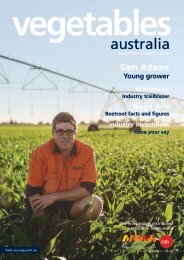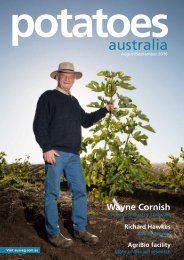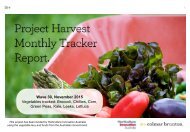potatoes
PA-DECJAN2016
PA-DECJAN2016
You also want an ePaper? Increase the reach of your titles
YUMPU automatically turns print PDFs into web optimized ePapers that Google loves.
The Front Line<br />
21<br />
submissions closed in mid-<br />
December 2015.<br />
A major addition to the<br />
regulations, which is not present<br />
in the Quarantine Regulations<br />
2000, is the inclusion of the<br />
Inspector-General of Biosecurity<br />
and the ability for stakeholders<br />
to request a review of the<br />
process of a specific BIRA by<br />
the Inspector-General.<br />
What is the Inspector-<br />
General of Biosecurity?<br />
In 2008, as part of its<br />
preliminary response to the<br />
Review of Australia’s Quarantine<br />
and Biosecurity Arrangements,<br />
as well as in response to the<br />
Equine Influenza outbreak<br />
of 2007–08, the Federal<br />
Government agreed to establish<br />
the office of the Interim<br />
Inspector-General of Biosecurity<br />
within the Department of<br />
Agriculture.<br />
On 1 July 2009, the government<br />
appointed an Interim Inspector-<br />
General of Biosecurity to<br />
conduct regular audits of the<br />
biosecurity system. Currently,<br />
audits carried out by the Interim<br />
Inspector-General of Biosecurity<br />
identify areas of weakness in the<br />
system and inform government<br />
and industry regarding areas<br />
that represent an effective<br />
allocation of resources. Under<br />
the Federal Biosecurity Act<br />
2015, the Inspector-General<br />
of Biosecurity will become a<br />
statutory position.<br />
An evolving system<br />
Upcoming changes to key<br />
biosecurity legislation, such as<br />
the Federal, Queensland and<br />
New South Wales Biosecurity<br />
Acts, have made it clear that the<br />
Australian biosecurity system<br />
will soon be entering a new era.<br />
The addition of the General<br />
Biosecurity Obligation in<br />
primary state legislation will<br />
undoubtedly initiate changes<br />
in attitude towards biosecurity<br />
responsibilities. Under this<br />
new paradigm, biosecurity<br />
responsibility will be held by all<br />
stakeholders, rather than being<br />
left solely to government or<br />
industry.<br />
A major challenge, however,<br />
will be making stakeholders<br />
aware of this obligation. It is<br />
important not to understate the<br />
i<br />
importance of joint responsibility<br />
in the Australian biosecurity<br />
system – a concept emphasised<br />
in the 2008 Beale Review:<br />
“One biosecurity, a working<br />
partnership” – but one that is yet<br />
to come to fruition in Australia.<br />
What is clear is the essential<br />
role to be played by industry<br />
representatives in the evolution<br />
of this space.<br />
Any unusual plant pest should be reported immediately to the relevant<br />
state or territory agriculture agency through the Exotic Plant Pest<br />
Hotline (1800 084 881).<br />
For further information, see the farm biosecurity website at www.<br />
farmbiosecurity.com.au, or contact AUSVEG National Manager –<br />
Scientific Affairs Dr Jessica Lye on (03) 9882 0277 or email<br />
jessica.lye@ausveg.com.au.<br />
Potatoes Australia December 2015/January 2016<br />
Potato spindle tuber viroid update<br />
Potato spindle tuber viroid (PSTVd) is highly transmissible by<br />
touch. The viroid causes significant disease symptoms that affect<br />
production and certification arrangements for a broad range of host<br />
species, including capsicums, tomatoes and <strong>potatoes</strong>.<br />
PSTVd has never been detected in Australian <strong>potatoes</strong>.<br />
Australian-produced certified seed <strong>potatoes</strong> undergo testing,<br />
crop inspection and monitoring regimes to meet certification<br />
requirements.<br />
In response to detections of PSTVd in Queensland and Western<br />
Australia, the Victorian Department of Economic Development,<br />
Jobs, Transport and Resources (DEDJTR), Biosecurity South<br />
Australia and Biosecurity New South Wales will be imposing<br />
restrictions on certain high risk host material effective 1 March<br />
2016.<br />
The following conditions will come into force.<br />
PSTVd damage. Photo courtesy of the European<br />
and Mediterranean Plant Protection Organization.<br />
Seed <strong>potatoes</strong>:<br />
• Must be accompanied by a certified seed docket verifying<br />
that the consignment was produced in accordance with the<br />
requirements of the National Seed Potato Certification<br />
Standards; or<br />
• Must be accompanied by a plant health certificate or<br />
assurance certificate certifying that the consignment has<br />
originated from a crop that has been tested 1 for PSTVd.<br />
• In South Australia and Victoria, these restrictions will be<br />
imposed at state borders.<br />
• The above restrictions in New South Wales will only<br />
apply to the entry of host material into the Guyra and<br />
Crookwell plant protection districts.<br />
For further information, please contact DEDJTR on 136 186,<br />
Biosecurity SA on (08) 8207 7900 and Biosecurity NSW on<br />
(02) 9638 1976.<br />
1<br />
Tested means that a 200 leaf sample has been collected from<br />
the crop during the growing season and tested at an approved<br />
laboratory (Crop Health Services) for the presence of PSTVd.<br />
PSTVd damage. Photo courtesy of<br />
Central Science Laboratory, Harpenden.








